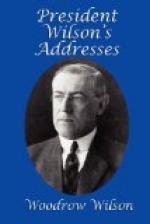MEMORIAL DAY ADDRESS
[Delivered at the National Cemetery, Arlington, Va., May 30, 1914.]
LADIES AND GENTLEMEN:
I have not come here to-day with a prepared address. The committee in charge of the exercises of the day have graciously excused me on the grounds of public obligations from preparing such an address, but I will not deny myself the privilege of joining with you in an expression of gratitude and admiration for the men who perished for the sake of the Union. They do not need our praise. They do not need that our admiration should sustain them. There is no immortality that is safer than theirs. We come not for their sakes but for our own, in order that we may drink at the same springs of inspiration from which they themselves selves drank.
A peculiar privilege came to the men who fought for the Union. There is no other civil war in history, ladies and gentlemen, the stings of which were removed before the men who did the fighting passed from the stage of life. So that we owe these men something more than a legal reestablishment of the Union. We owe them the spiritual reestablishment of the Union as well; for they not only reunited States, they reunited the spirits of men. That is their unique achievement, unexampled anywhere else in the annals of mankind, that the very men whom they overcame in battle join in praise and gratitude that the Union was saved. There is something peculiarly beautiful and peculiarly touching about that. Whenever a man who is still trying to devote himself to the service of the Nation comes into a presence like this, or into a place like this, his spirit must be peculiarly moved. A mandate is laid upon him which seems to speak from the very graves themselves. Those who serve this Nation, whether in peace or in war, should serve it without thought of themselves. I can never speak in praise of war, ladies and gentlemen; you would not desire me to do so. But there is this peculiar distinction belonging to the soldier, that he goes into an enterprise out of which he himself cannot get anything at all. He is giving everything that he hath, even his life, in order that others may live, not in order that he himself may obtain gain and prosperity. And just so soon as the tasks of peace are performed in the same spirit of self-sacrifice and devotion, peace societies will not be necessary. The very organization and spirit of society will be a guaranty of peace.
Therefore this peculiar thing comes about, that we can stand here and praise the memory of these soldiers in the interest of peace. They set us the example of self-sacrifice, which if followed in peace will make it unnecessary that men should follow war any more.




